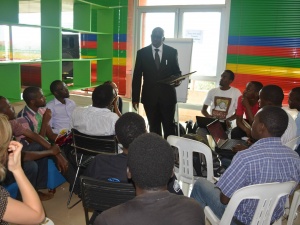You are here
Add new comment
Open Data Day (Data expedition session) - Barabara team focusing on Infrastructure
Submitted by sopio on 4 March 2015 - 9:05am
On Feb 21st 2015, a team of youthful innovators came together during the open data day event at outbox to devise means on how to improve usage of available data resource on the various platforms and responsible offices. Four various fields/themes were suggested for a clear path. These themes included;
- Education
- Health
- Infrastructure
- Energy
We focus on the third theme, Infrastructure, that was selected by the “Barabara Team”. The team has got a diversity of talents that include, web developers, Geographic Information Systems (GIS) analysts, journalists, Web content creators, and students from Makerere University.
This document entails all the brain stormed ideas that address the following questions;
- What is the problem / issue we are trying to solve?
- How do we intend to solve it ?
- Who are the target users and how will the solution create help me?
- Who are the stakeholders and how do we intend to maintain the solutions?
Definition
Infrastructure is the basic physical and organizational structures and facilities (e.g. buildings, roads, power supplies) needed for the operation of a society or enterprise.
There are different kinds of infrastructures put in place across Uganda from transportation systems to water supply systems.
Our Focus
This was based on the transportation system in Uganda with a case study of the quality of Roads hence the name Barabara. Our brainstorming session was put in terms of questions and answers as follows.
What frameworks are in place to support infrastructure?
Different kinds of physical infrastructures ie Roads, Bridges and railways.
What is the problem on ground?
Note:
Consider bringing stakeholders on board.
Focus on problem first then find available data sets
Problems
Transport: road projects, tracking road development and contractors
Schools: buildings, numbers.
Transportation
Financial input Vs Output / performance
Timelines for implementation
City/towns - city councils and authorities.
Highways constructions - Uganda National Roads Authority (UNRA
Source of Resources!
Mechanisms involved in planning and consultation, Monitoring and Evaluation, managing road projects?
Contractor credentials, track records and bidding processes?
Dependence on citizen feedback.
What do citizens expect of local road projects?
Data we are working with
- Names of Roads
- Distance
- location (start and end)
- time frame for construction
- type of road surface
- contractors
- funding and funders
- Regulations and maintenance plans eg use of road having a heavy duty usage.
- Speed limitations
- Carriage (dual, single ?)
Data Sources
- UNRA website
- socrata.com
- worldbank (data.worldbank.org) and local offices (real data sits on their desks)
- data.ug
- askyourgov.orrg
- africaopendata.org
- openstreetmaps.org, google maps (streetview)
- UBOS Census data (Mr. Benard Muhwezi)
Dealing with road user issues
- universal access (usable formats like csv and xls)
- legal issues
- user devices
- publicizing (How do i get to know)
- submission of data and verifying
- sustainability : crowd sourcing / social media coverage
- visualization : how to make sense of data using maps
- Access to Application Programming Interfaces (APIs) for developers
- Language: Localization
User Experience
- Simple and relevant searchable website / interface
- location awareness
- Data submission capabilities (uploading of photos, videos, maps)
- Security measures : Authentication
- Creating impact through broadcasting (news and social media)
- requesting for road agendas in campaign manifestos
- online information extraction (use of pdf scraping tools)
- localization ( translating the platform into local languages)
- Alerts ( sending notification and feedback to the masses)
Tools to use
- pdf to word convertor (for scrapping)
- tableau (for visualization)
- tabula (pdf extraction)
- socrata (scraping alternative )
- R (for analysis and integration), Python language (for software development), Django (for the web framework to aid in API modular development and language integration and calls to the system). All calls and functionalities made must be json encoded and authentication may be required.
- convertcsv.com(html tables to csv)
- html5 sencha (presentation)
Note:
Build light for open source code reuse
Sustainability
- offer free data
- access to data APIs for customization requires a fee.
- donations and funding (accountability)
- Reaching out to the grassroots through sms and data ambassadors
- in house academy for data scientists
- incentivise documented feedback through events and souvenirs (T-shirts, pens notebooks etc)
- integrations with other platforms like AidData.
- Single time login. (Social media connects ie facebook connect, twitter connect, google connect)
- Sharable data on websites - Links to share information and findings from our site to other sites
- data partnerships with organisations and angel investors
- training journalists on using open data
Objectives
- To collect data on road conditions and development progress
- To process and transform data sets into useful information for the common man
- To Disseminate and Visualize data so as to advocate for change and development.
- To allow citizen manage and engage in their own area developments


